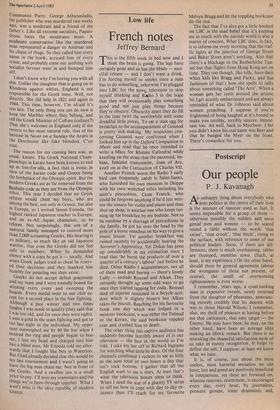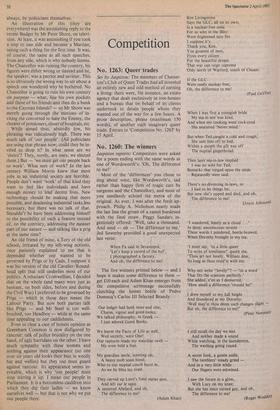Postscript
Our people
P. J. Kavanagh
unhappy thing about everybody who puts politics at the centre of their lives is the amount of rancour used as fuel. It seems impossible for a group of them — otherwise possibly the mildest and most genial men and women — to be seated round a table without the words 'that swine', 'that crook', 'that bitch', rising to the surface, with reference to some of our political leaders. Soon, if there are dif- ferences, there is much overheating, tables are thumped, enmities sown. (Such, at least, is my experience.) On the other hand, should there be general agreement (about the wrongness of those not present, of course), the smell of overweening righteousness is even worse.
I remember, years ago, a cruel-looking man in expensive tweeds, newly returned from the slaughter of pheasants, announc- ing entirely credibly that his dearest wish was to shoot Harold Wilson; I remember, also, my thrill of pleasure at having before me that caricature, that easy target — the Enemy. He may have been; he may, on the other hand, have been an average idiot , making an idiotic remark. But there is no ' mistaking the shameful satisfaction most of us take in enemy recognition. It helps to define the self, I suppose: at least we know what we hate.
It is, of course, just about the most useless, most harmful sensation we can have; lust and greed are positively beneficial in comparison, yet these are frowned on, whereas rancour, resentment, is encouraged every day, every hour, by journalists, pressure groups, some dramatists and, always, by politicians themselves.
An illustration of this (they are everywhere) was the astonishing reply to the recent Budget by Mr Peter Shore, on televi- sion. At least, it was astonishing if you took a step to one side and became a Martian, seeing such a thing for the first time. It was, of course, the same as all such speeches, from any side, which is why nobody listens. The Chancellor was ruining the country, his figures were either wrong or slanted and he, the speaker, was a patriot and saviour. This is so obviously the wrong way to set about a speech one wondered why he bothered. No Chancellor is going to ruin his own country on purpose — what, line his own pockets and those of his friends and then do a bunk to the Cayman Islands? — so Mr Shore was merely going through the motions of in- viting the converted to hate the Enemy, the cheater of pensioners, closer of hospitals, etc.
While aimed thus, absurdly low, his phrasing was ridiculously high. There was much talk of 'our people'. (All politicians are using that phrase now; could they be in- vited to drop it? In what sense are we 'theirs'? They, surely, are ours; we elected them.) But — 'we must get our people back to work'. What sort of work? In the last century William Morris knew that most jobs in an industrial society are horrible. People don't want 'work' of that kind they want to feel like individuals and have enough money to lead decent lives. New technology should be making that more possible, and deadening industrial tasks less necessary, but there was no talk of that. Shouldn't he have been addressing himself to the possibility of such a feature instead of, on the contrary, addressing the meaner part of our nature — and talking like a prig at the same time?
An old friend of mine, a Tory of the old school, irritated by my left-wing notions, once patiently explained to me that it depended whether one wanted to be governed by Prigs or by Cads. I suppose it was his version of the old Cavalier/Round- head split that still underlies most of our politics. A reluctant Cromwellian, I decided that on the whole (and many were just as hesitant, on both sides, before and during the Civil War) I preferred to be governed by Prigs — which in those days meant the Labour Party. But now both parties talk like Prigs — and Mr Steel is too well- brushed, too Headboy — while at the same time appealing to our caddishness.
Even so clear a case of honest opinion as Greenhorn Common is now disfigured by rancour: talk of police brutality on the one hand, of ugly harridans on the other. I have much sympathy with these women and nothing against their appearance (no one over six years old looks their best in woolly hat and wellies) but they too must guard against rancour. Its appearance seems in- evitable, which is why 'our people' must stop stirring it up. I mean our people in Parliament. It is a bottomless cauldron into which they dip their ladles — we know ourselves well — but that is not why we put our people there.







































 Previous page
Previous page